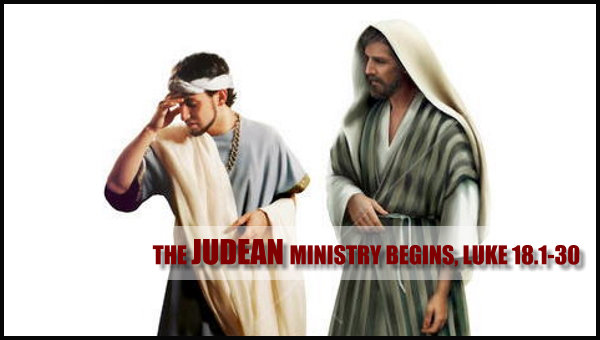By Tyson Thorne

The Judean Ministry at Various Cities (19.28-24.53), 18.1-30
Growing up, my mother was fond of telling my sister and I, “When God tells us to do something it is very important. When he tells us to do something more than one it is very, very important.” At the beginning of chapter 18, Jesus tells another parable that teaches a truth he had revealed back in chapter 11 (you may want to revisit that teaching which may be found here: http://www.think-biblically.com/10-lucubrations/487-teach-us-to-pray). While it still seems inconsistent to me, Jesus tells us a second time to repeatedly go before God with our concern until he answers us.
As I said in a previous post, it seems that nagging the Creator would be a bad thing. According to our savior, however, this is exactly what we ought to do if our petition is of importance to us. Like the widow going before the unjust judge, we are to continually petition God for those matters that weigh heavy on our hearts. A friend of mine is fond of saying that anyone can serve as an example, even if it’s a bad one. In this case, the unjust judge serves as an example to us for if even he can finally do what is right we can depend upon God to do even more. The widow also serves as an example, this one for us to follow by not giving up – either on prayer or on God. Jesus then asks a thoughtful question, upon his return will he “find faith on earth?” We must stay persistent in our faith in God and prayer which will lead to persistence in prayer.
Such persistence leads not only to greater faith (and answered prayer) but also to true righteousness. This is clearly in view in the next parable of the Pharisee and the Tax Collector. Unlike the Pharisee who measured his righteousness through comparing himself to other people, the tax collector compared himself to God for a more accurate measure. When we compare ourselves to God we always come up short. Here we find a third benefit of faithfulness, first prayerful persistence, second growing faith in God and third a mounting righteousness due to humility. Humility is in view verse 16, as Jesus welcomes children to himself during his earthly ministry and welcomes into the Kingdom all who will come to him is the same state.
Shortly after this exchange a wealthy ruler came to Jesus asking what he must do to be saved. He obviously had the idea of salvation completely wrong, believing it was something he could accomplish through works rather than faith, righteousness and humility. Jesus tries to clue the young man in by asking the ruler why he called him good teacher. “No one is good except God” Jesus reminded him. In other words, one can never be good enough to inherit eternal life. Then Jesus ups the ante by referring to the law. The Law is intended to show mankind that we are none of us capable of being good enough to be saved. The ruler didn’t understand and stated his belief that he had kept the law. Jesus proved that he didn’t by advising the man to give away his wealth and possessions and to follow him. The fact that the ruler was unwilling to do so proved that he was not in keeping with the first of the Ten Commandments: his wealth was an idol he was unwilling to give up for God.
Saddened, Jesus then tells the crowd that it is difficult for those blessed with wealth to find salvation, for they value the things of this world more than they do the God who created it all. He uses a colorful turn of phrase to drive the point home, “It is easier for a camel to go through the eye of a needle than for a rich person to enter the Kingdom of God.” I’ve heard it taught that the phrase “eye of the needle” is a reference to a small city gate, but I find no evidence of such in the text. The Greek word Jesus uses in belones, which is a literal needle. Therefore, it would be impossible for a rich man to be saved. How can this be? Jesus is quick to note that what is impossible for humans is possible for God, meaning that God can indeed bring a rich person to salvation (something that will be accomplished in the very next chapter). Again, salvation is not something that we (humans) can accomplish, but something God accomplishes in us.
|
|
